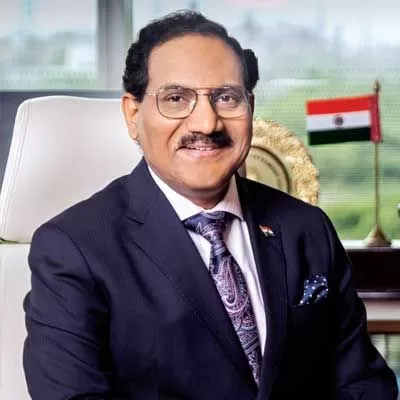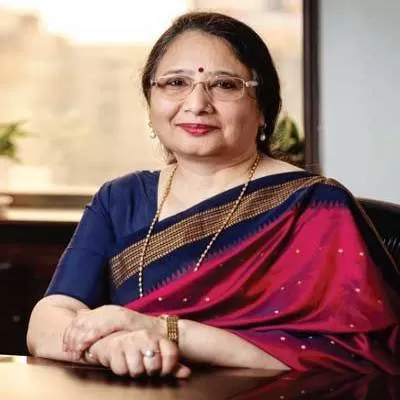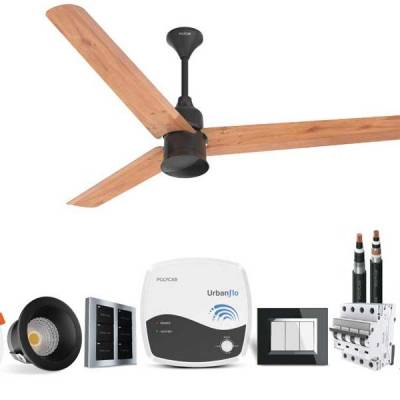- Home
- Infrastructure Energy
- POWER & RENEWABLE ENERGY
- My company looks up to me for the financial decisions I make
My company looks up to me for the financial decisions I make
CW presents the next in a series of interviews with women who have made their mark in the building and construction sector.
It’s acumen, not age, that defines a professional. Testimony to this is 27-year old Priyanka Gupta, Executive Director, MPIL Steel Structures Ltd, a woman with a plan to make her company a technology leader with global practices and a commitment to renewable energy. Here’s an example: MPIL Steel Structures Ltd, which boasts a steel fabrication capacity of 50,000 metric tonne and is the only company manufacturing steel for solar panel mounting structures in India, has become the first in the country to use solar panels on the roofs of its plant in Tarapur, Maharashtra. Armed with a Bachelor’s in Economics from Connecticut College, a degree in development economics from Oxford University and a Master’s in international finance from New York University, Gupta has worked with World Bank, the IMF and the Fund for the City of New York before coming home to MPIL – her family business – to oversee all financial, operational and business development activities. Today, she leads MPIL through “a keen gendered lens,” while retaining time for pet pursuits like exploring gadgets and long-distance cycling. Yet, as she tells Group Managing Editor, Falguni Padode, it’s the professional in her that drives her...
How long have you worked with MPIL?
This is my fifth year full time. I have a finance background, but as a family business, we have grown in steel. Primarily, the family is into iron ore logistics; we run a large parent company called PTCL Infrastructure Ltd. My father started MPIL in 2001 to explore the idea of steel as a material for construction, a relatively young concept in India. In a bid to be environment-friendly, we have a whole new renewable steel. Further, we are aggressively entering the solar market. We are pioneers in terms of making solar marketable as an in-built integrated construction solution.
Tell us about your own professional background.
I have worked in various places, primarily in Africa and East Europe, with the World Bank. I used to give out loans for construction projects and multilateral aid. I learnt a lot about the technicalities of the business – the materials, time, contractors. I was also a loan officer at the New York Fund. I have been very fortunate to be at the right place at the right time and get all this exposure. Sometimes, opportunities come, and people are unwilling to take them; for instance, no one wants to go to Ghana and Macedonia. I understood that if I had to understand development, it had to be in a developing country.
What brought you back to India?
My family’s business! I wanted to bring the skill sets and experience I had acquired to India. I always felt there was a larger role for me to lead a manufacturing space; my father gave me the platform to do that. I head the plant in Tarapur and the new plant in Karnataka. In fact, my brother has also come back recently; he heads the solar business.
After working overseas, how has it been to come back?
India was not an eye-opener for me. We have been in business all our life. I actually enjoy the way things get done here – there is a whole rhythm; you require certain patterns and aggression! Of course, the steel industry is changing in terms of business practices, contracts and level of expertise in design and engineering.
Is your work as stimulating as you envisaged it to be?
Yes, it is exciting – full of new things, new ideas and lots of troubleshooting! The company is naturally evolving. There is a high level of professionalism and keenness to explore different technologies. Work is more focussed on the environment, speed and efficiency.
Given that you are not an engineer, does your expertise primarily lie in business development?
You cannot do any business development unless you are technically smart about your product. I have made up for my lack of engineering training with my experience. I can troubleshoot any machine in my factory, any spare part, bearing, whatever. I am glad I have the financial skills because, as a businesswoman, I have to understand money, and engineers are technically grounded at times. My whole company looks up to me for the financial decisions I make.
You say we are becoming more tech-savvy and conscious about renewable energies. Where do you see the shift?
Look, first there was a cell phone, and a computer, and then an iPod; now, your phone does everything. That is the technology shift; everything has become integrated. It’s the same with construction. In steel, we are telling people that concrete buildings will take 12 months to build and steel will take four. We talk about smart phones; here, we are making smart buildings – energy-efficient, renewable, full package buildings. We are making full plants, renewable from the solar roof. That is the future. People won’t have to find a civil contractor or consultant or electrician or anything. Construction will become simple, automated and integrated – a one-stop solution – and people will be able to focus on other things.
Are you moving in that direction?
Yes, absolutely. We are making smart buildings ourselves. We use the word smart because it is a trademark. Our buildings are energy-efficient and we are already on the way to becoming a smart technology provider.
What is your current role?
I do everything that involves riding the cycle of growth. I do R&D; I head business development, and order, retail and project sale. I look after raw material procurement, machine planning. I am looking at the next plant in Karnataka, expansion in Tarapur. It is a small company, so we have to be involved in everything, from operations to administration, technical aspects and sales.
What kind of growth are you looking at?
We are looking to become technology leaders for the country. We want to set up our Karnataka plant, which is much larger than our Tarapur plant, as a role model and signature plant in terms of the structures it will fabricate. We want to set up the solar market, establish a new plant in Gujarat; we want to sell more smart buildings and educate people about them. We want to invest in technology and solar research; we want partnerships. There is tremendous potential.
You have grown 400 per cent...
Our CAGR has been more than 500 per cent.
What do you attribute the growth to?
First, it was just my father; then, we were three of us. When you have two more people, you can grow much faster. We looked at our strengths, industry and market needs and undertook strategic partnerships. In India, people had never seen this in steel.
Having entered the family business, has gender been immaterial?
Family business or not, gender is in no way immaterial. In every space, it is a stark teller of my identity, and I cannot hide it. I do not have any negative stories about it; I have not faced any glass ceiling, but it is something I have to deal with. People come and say, “You are young, and we are not sure if your company can give 1,200 tonne of steel because you look young.” I have to convince them.
But, is that to do with you or your gender?
There is a confluence of various identities: gender, youth, age, experience. It is just that people are not used to having their final negotiations with women. In steel, there are no women. So, if my office says they will put the director on, people expect to talk to a man. With the people I work with – our vendors, clients and suppliers – it is fine, but every time there is someone new to meet, I can sense the tension until I break it. Nevertheless, there are also certain advantages to being a young woman, because people allow you a lot of slack!
How many people do you work with at MPIL?
At MPIL, we have 450-500 employees; that does not include our production-outsource contracts, site supervisors and site teams.
Dealing with 450 people is not easy...
No business school degree can prepare you for it. We have ourselves hired most of these people; I have myself hired the 80 people in this office.
What have your experiences with contractors been like?
We do a lot of work with MIAL and L&T, and they are a big learning opportunity for us. Both of them have a QC lab in our factory, and they check every single welding joint. Their quality consciousness makes us step up to that kind of level. Whether it is a contractor, a mid- or small-sized company or family business, everyone is doing something innovative. Their stories are exciting, and it is great for us to be involved because we can suggest ideas. Client interactions are fun.
What about the unsavoury aspects of the business?
I do not know which industry in India can stand up and say it is clean. But, it is getting cleaned out. I think we are much better off than most industries because we are technical and there is very little room for anything else. If you have to make 18 mega columns, you have to make 18 mega columns. Everything is in the books, and we have stakeholders; so, our business and clients do not face so much of it.
What are your business plans going forward?
My business plans include setting up the Karnataka plant; our focus is to start production in April. Then, scale up the production and set up plants around the country. The next strategic step is Gujarat.
What about the solar business?
We are scaling up our solar production in the Tarapur factory. The Gujarat facility will be entirely solar.
Where do you see the industry in future?
India will become a supplier in steel and construction and the larger renewable space. Demand still needs to grow locally, but India will become a large contributor to infrastructure in Indonesia, Africa, the Far East, East Europe, and the Middle East. At MPIL, we are excited about each and every project. We will become a large industry player soon.
What are your own personal goals?
I would like to cycle more in the next five years. That is my personal plan. I have a lot of structured plans for the company. If I have my own plan, I cannot drive MPIL, but if MPIL is doing well, it will drive me along. It is very different to segregate the two at this point.
So, all this is intertwined?
Yes, the business is very personal for us as a family. Our personal goals change according to our plans for the company. It is very difficult to say where I will be in the next five years. In a growing industry, it is very hard to have a clear roadmap; so many opportunities come, and we want to be open to them.
– Priyanka Gupta, Executive Director, MPIL Steel Structures LtdCW presents the next in a series of interviews with women who have made their mark in the building and construction sector.It’s acumen, not age, that defines a professional. Testimony to this is 27-year old Priyanka Gupta, Executive Director, MPIL Steel Structures Ltd, a woman with a plan to make her company a technology leader with global practices and a commitment to renewable energy. Here’s an example: MPIL Steel Structures Ltd, which boasts a steel fabrication capacity of 50,000 metric tonne and is the only company manufacturing steel for solar panel mounting structures in India, has become the first in the country to use solar panels on the roofs of its plant in Tarapur, Maharashtra. Armed with a Bachelor’s in Economics from Connecticut College, a degree in development economics from Oxford University and a Master’s in international finance from New York University, Gupta has worked with World Bank, the IMF and the Fund for the City of New York before coming home to MPIL – her family business – to oversee all financial, operational and business development activities. Today, she leads MPIL through “a keen gendered lens,” while retaining time for pet pursuits like exploring gadgets and long-distance cycling. Yet, as she tells Group Managing Editor, Falguni Padode, it’s the professional in her that drives her...How long have you worked with MPIL?This is my fifth year full time. I have a finance background, but as a family business, we have grown in steel. Primarily, the family is into iron ore logistics; we run a large parent company called PTCL Infrastructure Ltd. My father started MPIL in 2001 to explore the idea of steel as a material for construction, a relatively young concept in India. In a bid to be environment-friendly, we have a whole new renewable steel. Further, we are aggressively entering the solar market. We are pioneers in terms of making solar marketable as an in-built integrated construction solution.Tell us about your own professional background.I have worked in various places, primarily in Africa and East Europe, with the World Bank. I used to give out loans for construction projects and multilateral aid. I learnt a lot about the technicalities of the business – the materials, time, contractors. I was also a loan officer at the New York Fund. I have been very fortunate to be at the right place at the right time and get all this exposure. Sometimes, opportunities come, and people are unwilling to take them; for instance, no one wants to go to Ghana and Macedonia. I understood that if I had to understand development, it had to be in a developing country.What brought you back to India?My family’s business! I wanted to bring the skill sets and experience I had acquired to India. I always felt there was a larger role for me to lead a manufacturing space; my father gave me the platform to do that. I head the plant in Tarapur and the new plant in Karnataka. In fact, my brother has also come back recently; he heads the solar business.After working overseas, how has it been to come back?India was not an eye-opener for me. We have been in business all our life. I actually enjoy the way things get done here – there is a whole rhythm; you require certain patterns and aggression! Of course, the steel industry is changing in terms of business practices, contracts and level of expertise in design and engineering.Is your work as stimulating as you envisaged it to be?Yes, it is exciting – full of new things, new ideas and lots of troubleshooting! The company is naturally evolving. There is a high level of professionalism and keenness to explore different technologies. Work is more focussed on the environment, speed and efficiency.Given that you are not an engineer, does your expertise primarily lie in business development?You cannot do any business development unless you are technically smart about your product. I have made up for my lack of engineering training with my experience. I can troubleshoot any machine in my factory, any spare part, bearing, whatever. I am glad I have the financial skills because, as a businesswoman, I have to understand money, and engineers are technically grounded at times. My whole company looks up to me for the financial decisions I make.You say we are becoming more tech-savvy and conscious about renewable energies. Where do you see the shift?Look, first there was a cell phone, and a computer, and then an iPod; now, your phone does everything. That is the technology shift; everything has become integrated. It’s the same with construction. In steel, we are telling people that concrete buildings will take 12 months to build and steel will take four. We talk about smart phones; here, we are making smart buildings – energy-efficient, renewable, full package buildings. We are making full plants, renewable from the solar roof. That is the future. People won’t have to find a civil contractor or consultant or electrician or anything. Construction will become simple, automated and integrated – a one-stop solution – and people will be able to focus on other things.Are you moving in that direction?Yes, absolutely. We are making smart buildings ourselves. We use the word smart because it is a trademark. Our buildings are energy-efficient and we are already on the way to becoming a smart technology provider.What is your current role?I do everything that involves riding the cycle of growth. I do R&D; I head business development, and order, retail and project sale. I look after raw material procurement, machine planning. I am looking at the next plant in Karnataka, expansion in Tarapur. It is a small company, so we have to be involved in everything, from operations to administration, technical aspects and sales.What kind of growth are you looking at?We are looking to become technology leaders for the country. We want to set up our Karnataka plant, which is much larger than our Tarapur plant, as a role model and signature plant in terms of the structures it will fabricate. We want to set up the solar market, establish a new plant in Gujarat; we want to sell more smart buildings and educate people about them. We want to invest in technology and solar research; we want partnerships. There is tremendous potential.You have grown 400 per cent...Our CAGR has been more than 500 per cent.What do you attribute the growth to?First, it was just my father; then, we were three of us. When you have two more people, you can grow much faster. We looked at our strengths, industry and market needs and undertook strategic partnerships. In India, people had never seen this in steel.Having entered the family business, has gender been immaterial?Family business or not, gender is in no way immaterial. In every space, it is a stark teller of my identity, and I cannot hide it. I do not have any negative stories about it; I have not faced any glass ceiling, but it is something I have to deal with. People come and say, “You are young, and we are not sure if your company can give 1,200 tonne of steel because you look young.” I have to convince them.But, is that to do with you or your gender?There is a confluence of various identities: gender, youth, age, experience. It is just that people are not used to having their final negotiations with women. In steel, there are no women. So, if my office says they will put the director on, people expect to talk to a man. With the people I work with – our vendors, clients and suppliers – it is fine, but every time there is someone new to meet, I can sense the tension until I break it. Nevertheless, there are also certain advantages to being a young woman, because people allow you a lot of slack!How many people do you work with at MPIL?At MPIL, we have 450-500 employees; that does not include our production-outsource contracts, site supervisors and site teams.Dealing with 450 people is not easy...No business school degree can prepare you for it. We have ourselves hired most of these people; I have myself hired the 80 people in this office.What have your experiences with contractors been like?We do a lot of work with MIAL and L&T, and they are a big learning opportunity for us. Both of them have a QC lab in our factory, and they check every single welding joint. Their quality consciousness makes us step up to that kind of level. Whether it is a contractor, a mid- or small-sized company or family business, everyone is doing something innovative. Their stories are exciting, and it is great for us to be involved because we can suggest ideas. Client interactions are fun.What about the unsavoury aspects of the business?I do not know which industry in India can stand up and say it is clean. But, it is getting cleaned out. I think we are much better off than most industries because we are technical and there is very little room for anything else. If you have to make 18 mega columns, you have to make 18 mega columns. Everything is in the books, and we have stakeholders; so, our business and clients do not face so much of it.What are your business plans going forward?My business plans include setting up the Karnataka plant; our focus is to start production in April. Then, scale up the production and set up plants around the country. The next strategic step is Gujarat.What about the solar business?We are scaling up our solar production in the Tarapur factory. The Gujarat facility will be entirely solar.Where do you see the industry in future?India will become a supplier in steel and construction and the larger renewable space. Demand still needs to grow locally, but India will become a large contributor to infrastructure in Indonesia, Africa, the Far East, East Europe, and the Middle East. At MPIL, we are excited about each and every project. We will become a large industry player soon.What are your own personal goals?I would like to cycle more in the next five years. That is my personal plan. I have a lot of structured plans for the company. If I have my own plan, I cannot drive MPIL, but if MPIL is doing well, it will drive me along. It is very different to segregate the two at this point.So, all this is intertwined?Yes, the business is very personal for us as a family. Our personal goals change according to our plans for the company. It is very difficult to say where I will be in the next five years. In a growing industry, it is very hard to have a clear roadmap; so many opportunities come, and we want to be open to them.

















